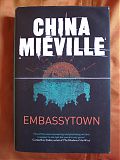
China Miéville
Embassytown
As I read Embassytown, I gushed superlatives. Every-other-chapter I thought it appropriate to insist to Simon again, “You must read this book.” I’ll spare you, dear internet reader, such a biased demand, but I do hope that by the end of this post you’ll be tempted to reach for Embassytown yourself (because you really should read this book).
Part of why I enjoyed Embassytown so much is because its sci-fi genre allows for the exploration into the intellectual and imaginative realms impossible in a strictly realist novel. From the beginning, the reader is immersed in a place where the “normal” physical and social rules of everyday life do not apply. I wandered through the extra-planetary societies of China Miéville’s mind, a mind that is both poetic and active. He invents words for his inventions, places, technologies, exot races. (And I must also say this about China Miéville, by his look I classify him as a literary thug, for which “literary” has desperate need.)
Embassytown is a city on a planet at the edge of the known universe (how much more poetic can one get?). The indigenous race is the Ariekei, monstrous looking creatures who peacefully share the planet, communicating with terre after the terre learned how. This book speaks a lot about language, and more specifically the Ariekene Language, a language that doesn’t allow for contradictions, metaphor, lies. Language can only be truth, direct representation, the thing-in-itself.
In the beginning was each word of Language, sound isomorphic with some Real: not a thought, not really, only self-expressed worldness, speaking itself through the Ariekei. Language had always been redundant: it had only ever been the world.
Human language is far from Language. Our language is crammed full of signifiers and metaphors. Humans can change unflinchingly from “I am like the bird in the sky” to “I am the bird flying high in the sky.” The metaphor is also the truth. In that way Embassytown preforms its own self-examination, investigating the uses of language.
The other reason why I enjoyed Embassytown so much was its heroine, Avice Benner Cho (a metaphor even the most superficial reader should notice: ABC). Avice is neither feminine nor unfeminine, adventurous nor a homebody, tough nor soft. In short, she is a very human human, a human packed with the contradictions, the being-and-not-being that the Ariekei absolutely cannot understand.
But these are the only the ideas, the undercurrents carrying the book along. From the beginning we are presented with a planet in flux, where things are no doubt going to change so that they will never again be the same. The action is extremely compelling; in the start trying to figure everything out and then once the plot takes off to only stop when the book is done.
I hope I have convinced you, dear reader, to keep an eye out for this book or better yet, to put it under your eye. Or if you’ve already read the book, thought about reading it or have never heard of it, I would love to hear what you have to say…
· · · · · · · · · · · · · · · · · · · ·